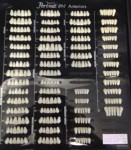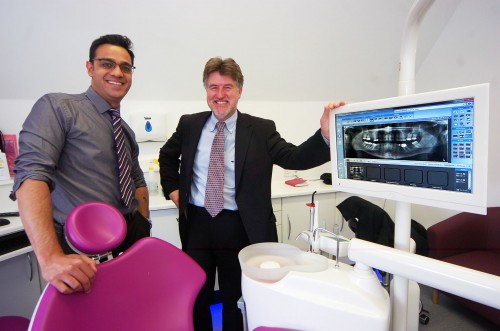Fortunately, a growing number of people in the UK are keeping their teeth longer however, there are times when we lose teeth and need to find the options to replace them. This blog post seeks to help the local people of Solihull, Birmingham and the Midlands to understand more about these options and to then make an informed decision about which one works best for them.
Your options to replace missing teeth.
You basically have four options if you have missing teeth:
- Do nothing and leave the gap.
- Dental bridges.
- Dentures.
- Dental implants.
Let’s look at each of these in turn…
1. Do nothing and leave the gap
When a tooth is lost most people just see the gap, at worst thinking it looks a little unsightly. The problem is it can be far more than this. All of your teeth are in a fine balance with one another, the teeth either side maintain the position of the tooth in the middle and the teeth on the top maintain the teeth position on the bottom, and vice versa. This is called the dental neutral zone and has been written about extensively in academic articles.
>> Read more about the dental neutral zone in an academic article.
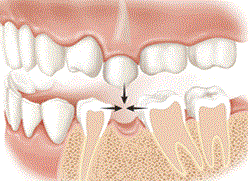
Everything works in a fine balance and unison with one another to keep the teeth in exactly the right place, without the pressure of the adjacent teeth or opposing teeth your natural teeth will have a tendency to move!
The teeth either side of the gap will tend to drift into it and teeth/tooth opposing it will have a tendency to drift up/down. This can have an impact on your dentist’s ability to replace the missing tooth with a new one, due to the change in size of the gap, and more importantly it can have implications on the way your teeth bite together.
If your teeth bite together the wrong way ( known as a malocclusion), which could happen if you had teeth missing, it puts pressure on your jaw and muscles of your head, face and neck. This can lead to headaches and jaw joint pain.
>> Read more about the effects of malocclusion
The recommendation is, wherever possible, replace your missing teeth with one of the following options.
2. Dental Bridges
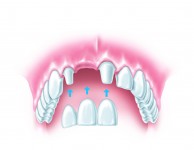
A dental bridge essentially bridges the gap between missing teeth. Your dentist will prepare the teeth either side of the gap by gently removing the outer surface of the tooth, reducing it to a stump. Over the top of this new teeth will be made which support the new tooth in between.
The teeth either side of the gap are known as abutment teeth and the new tooth in the middle is known as the pontic. Depending on the clinical situation two or three teeth can be replaced with new pontics in these areas, supported by an abutment tooth (One trimmed down to support the new bridge) on either side.
Dental bridges have been around for many years and are an exceptionally cosmetic and reliable way to replace your missing teeth. The biggest downside is that the abutment teeth either side of the missing teeth have to be trimmed down. Sometimes these teeth may be diseased or decayed and require reduction anyway, but if these teeth are otherwise healthy it can be unnecessarily destructive to trim away otherwise healthy tooth tissue.
3. Dentures
Dentures are low cost way and cheaper alternative for replacing missing teeth. Dental bridges can be more expensive because in order to replace one tooth you effectively need to pay for three, two abutment teeth (one either side of the gap) and the new pontic (replacement tooth) in the middle.
On the whole, dentures are a cheaper alternative as the materials and time involved making them is much less.
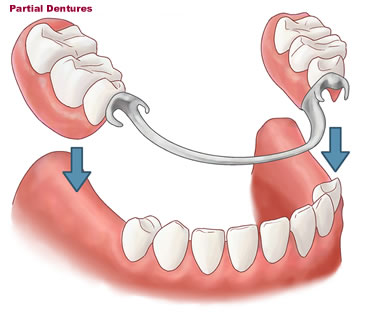 Partial dentures, those involving only a few teeth, can be held in place using clips known as clasps. These classes are typically made of stainless steel and engage in the undercut on the surrounding teeth. When you slide the denture in the clasps will click over the undercut and hold the denture firmly in place.
Partial dentures, those involving only a few teeth, can be held in place using clips known as clasps. These classes are typically made of stainless steel and engage in the undercut on the surrounding teeth. When you slide the denture in the clasps will click over the undercut and hold the denture firmly in place.
One of the biggest disadvantages with a denture is that they are removable, many people don’t like the idea of taking dentures out at night.
4. Dental Implants
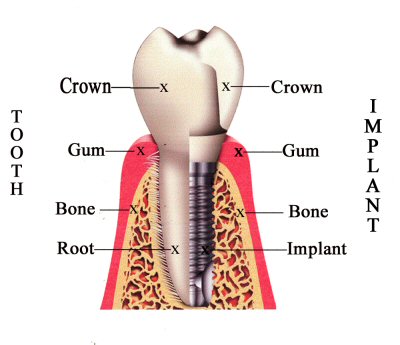 Dental implants can be one of the most successful ways to replace missing teeth, and here’s why.
Dental implants can be one of the most successful ways to replace missing teeth, and here’s why.
Dental implants are often the most conservative option for restoring missing teeth. They don’t involve reduction of otherwise healthy teeth either side of them like dental bridges. They also don’t put pressure on other teeth like dentures do with their class or clips.
Dental implants act independently in your mouth to support the bone around the extraction site, the adjacent teeth and the opposing teeth.
Because the dental implant is placed into the bone itself it helps to stop the inevitable bone loss which always happens after a tooth has been removed, as previously discussed. Preventing this loss of bone also means that the soft tissue (gum) is also protected, thereby preserving your more natural and cosmetic smile over a longer period of time.
As with the other forms of replacing missing teeth a dental implant also supports the adjacent teeth and stops them drifting in towards the gap whilst at the same time supporting the opposing tooth preventing it from over erupting.
As previously mentioned, the biggest advantage to a dental implant is the fact that it can prevent or at least significantly reduce, further bone loss on the extraction site.
The cost of dental implants.
Whilst the initial cost of dental implant may seem high, if you take into account the overall and long-term cost it can actually be the best value option. If you have a dental bridge to replace missing teeth then you need to pay for three elements of that bridge, the two teeth either side of the gap and the new tooth in the middle of the gap. A dental bridge may also need replacing in the future if the bone where the tooth has been extracted continues to resorb.
When you take into account the cost of dental implants, the number of years it will last, the number of hours per day you’ll actually be using it then it can work out as the best value option. Remember, you don’t only use your teeth when you eat, you use them when you smile and often at night whilst you are asleep you may gently grind your teeth together, this means a dental implant is in use for a considerable number of hours per day.
Here’s an interesting article we found in the Daily Mail about dental implants…
£30,000, 5 hours in surgery, weeks of mashed vegetables… but my implants really are worth it
- Holly Merrick had constant infections due to an overcrowded mouth
- She spent £30,000 on a full set of implants in 2012 after her divorce
- She says new teeth gave her the confidence to smile – and travel
Read more: http://www.dailymail.co.uk/health/article-2746133/30-000-5-hours-surgery-weeks-mashed-vegetables-implants-really-worth-it.html
If you would like a free consultation to discuss now you might replace missing teeth with dental implants then please book your free cosmetic dentistry consultation today.
 The Solihull Dental Centre and Implant Clinic has been providing dental implant treatments for 10 years. The practice is located on the High Street of Solihull town centre, a short drive from the centre of Birmingham and easily accessible from anywhere in the Midlands and Sutton Coldfield area.
The Solihull Dental Centre and Implant Clinic has been providing dental implant treatments for 10 years. The practice is located on the High Street of Solihull town centre, a short drive from the centre of Birmingham and easily accessible from anywhere in the Midlands and Sutton Coldfield area.




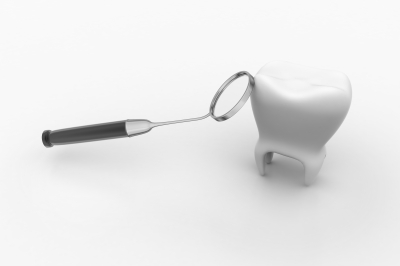


 Partial dentures, those involving only a few teeth, can be held in place using clips known as clasps. These classes are typically made of stainless steel and engage in the undercut on the surrounding teeth. When you slide the denture in the clasps will click over the undercut and hold the denture firmly in place.
Partial dentures, those involving only a few teeth, can be held in place using clips known as clasps. These classes are typically made of stainless steel and engage in the undercut on the surrounding teeth. When you slide the denture in the clasps will click over the undercut and hold the denture firmly in place.

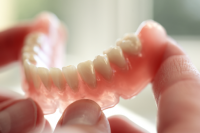 Did you know that a typical visit to a dentist for a new denture would usually involve the dentist sending your denture mould off to be made at a dental laboratory, with no clinical interaction between the dentist and technician, and no consultation between the technician and the patient?
Did you know that a typical visit to a dentist for a new denture would usually involve the dentist sending your denture mould off to be made at a dental laboratory, with no clinical interaction between the dentist and technician, and no consultation between the technician and the patient?